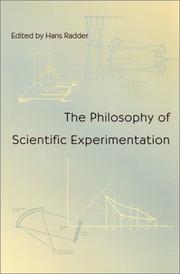| Listing 1 - 10 of 22 | << page >> |
Sort by
|
Book
Year: 1994 Publisher: Princeton, N. J. Princeton University Press
Abstract | Keywords | Export | Availability | Bookmark
 Loading...
Loading...Choose an application
- Reference Manager
- EndNote
- RefWorks (Direct export to RefWorks)
Book
ISBN: 0852642229 9780852642221 Year: 1977 Publisher: London : C. Griffin,
Abstract | Keywords | Export | Availability | Bookmark
 Loading...
Loading...Choose an application
- Reference Manager
- EndNote
- RefWorks (Direct export to RefWorks)
Mathematical statistics --- Science --- Statistique mathématique --- Sciences --- Experiments --- Expériences --- Statistique mathématique --- Expériences --- Science - Experiments
Book
ISBN: 9780226902043 0226902048 9780226902050 0226902056 1282894889 9781282894884 9780226902029 0226902021 0226902021 9780226902029 9786612894886 6612894881 Year: 2010 Publisher: Chicago: University of Chicago press,
Abstract | Keywords | Export | Availability | Bookmark
 Loading...
Loading...Choose an application
- Reference Manager
- EndNote
- RefWorks (Direct export to RefWorks)
Book
ISBN: 128357702X 9786613889478 0191646415 9780191646416 9781283577021 9780198566182 0198566182 9780198566199 0198566190 9780191774683 0191774685 0191646423 Year: 2012 Publisher: Oxford ; New York : Oxford University Press,
Abstract | Keywords | Export | Availability | Bookmark
 Loading...
Loading...Choose an application
- Reference Manager
- EndNote
- RefWorks (Direct export to RefWorks)
This novel book bridges the gap between the energetic and species approaches to studying food webs, addressing many important topics in ecology. Species, matter, and energy are common features of all ecological systems. Through the lens of complex adaptive systems thinking, the authors explore how the inextricable relationship between species, matter, and energy can explain how systems are structured and how they persist in real and model systems. Food webs are viewed as open anddynamic systems. The central theme of the book is that the basis of ecosystem persistence and stability rests on the
Coral reef ecology. --- Food chains (Ecology). --- Science -- Experiments. --- Science -- Study and teaching. --- General ecology and biosociology --- Food chains (Ecology) --- Ecology.

ISBN: 0198562691 Year: 1996 Publisher: Oxford New York Tokyo Oxford University
Abstract | Keywords | Export | Availability | Bookmark
 Loading...
Loading...Choose an application
- Reference Manager
- EndNote
- RefWorks (Direct export to RefWorks)
Book
ISBN: 0262378485 0262378493 Year: 2024 Publisher: Cambridge, Massachusetts : The MIT Press,
Abstract | Keywords | Export | Availability | Bookmark
 Loading...
Loading...Choose an application
- Reference Manager
- EndNote
- RefWorks (Direct export to RefWorks)
"This book addresses the need for scientists to understand the framework and approach in large science projects, both from the technical project management side as well as the sociology and governance of large science collaborations"--

ISBN: 0822957957 0822972395 9780822972396 9780822957959 Year: 2003 Publisher: Pittsburgh, Pennsylvania : University of Pittsburgh Press,
Abstract | Keywords | Export | Availability | Bookmark
 Loading...
Loading...Choose an application
- Reference Manager
- EndNote
- RefWorks (Direct export to RefWorks)
Since the late 1980s, the neglect of experiment by philosophers and historians of science has been replaced by a keen interest in the subject. In this volume, a number of prominent philosophers of experiment directly address basic theoretical questions, develop existing philosophical accounts, and offer novel perspectives on the subject, rather than rely exclusively on historical cases of experimental practice. Each essay examines one or more of six interconnected themes that run throughout the collection: the philosophical implications of actively and intentionally interfering with the material world while conducting experiments; issues of interpretation regarding causality; the link between science and technology; the role of theory in experimentation involving material and causal intervention; the impact of modeling and computer simulation on experimentation; and the philosophical implications of the design, operation, and use of scientific instruments
Science --- Experiments --- Philosophy. --- Methodology --- wetenschappelijk experiment --- expérimentation scientifique --- Natural science --- Science of science --- Sciences --- Experiments&delete& --- Philosophy --- Methodology&delete& --- Natural sciences --- Science - Experiments - Philosophy. --- Science - Methodology - Philosophy.
Book
ISBN: 0822981009 9780822981008 9780822944416 0822944413 Year: 2016 Publisher: Pittsburgh, Pennsylvania : University of Pittsburgh Press,
Abstract | Keywords | Export | Availability | Bookmark
 Loading...
Loading...Choose an application
- Reference Manager
- EndNote
- RefWorks (Direct export to RefWorks)
What makes a good experiment? Although experimental evidence plays an essential role in science, as Franklin argues, there is no algorithm or simple set of criteria for ranking or evaluating good experiments, and therefore no definitive answer to the question. Experiments can, in fact, be good in any number of ways: conceptually good, methodologically good, technically good, and pedagogically important. And perfection is not a requirement: even experiments with incorrect results can be good, though they must, he argues, be methodologically good, providing good reasons for belief in their results. What Makes a Good Experiment? revisits the important question Franklin posed in his 1981 article of the same title in BJPS, when it was generally believed that the only significant role of experiment in science was to test theories. But experiments can actually play a lot of different roles in science, as he explains--they can, for example, investigate a subject for which a theory does not exist, help to articulate an existing theory, call for a new theory, or correct incorrect or misinterpreted results. This book provides details of good experiments, with examples from physics and biology, illustrating the various ways they can be good and the different roles they can play.
Experimental design. --- Science --- Design of experiments --- Statistical design --- Mathematical optimization --- Research --- Statistical decision --- Statistics --- Analysis of means --- Analysis of variance --- Experiments --- Methodology --- Experimental design --- Science - Experiments --- Science - Methodology
Book
ISBN: 9781101946596 Year: 2017 Publisher: New York (N.Y.) : Knopf,
Abstract | Keywords | Export | Availability | Bookmark
 Loading...
Loading...Choose an application
- Reference Manager
- EndNote
- RefWorks (Direct export to RefWorks)
"What jobs should be automated? How should our legal systems handle autonomous systems? How likely is the emergence of suprahuman intelligence? A.I. is the future of science, technology, and business--and there is no person better qualified or situated to explore that future than Max Tegmark. What has A.I. brought us? Where will it lead us? The story of A.I. is the story of intelligence--of life processes as they evolve from bacteria (1.0) to humans (2.0), where life processes define their own software, to technology (3.0), where life processes design both their hardware and software. We know that A.I. is transforming work, laws, and weapons, as well as the dark side of computing (hacking and viral sabotage), raising questions that we all need to address: What jobs should be automated? How should our legal systems handle autonomous systems? How likely is the emergence of suprahuman intelligence? Is it possible to control suprahuman intelligence? How do we ensure that the uses of A.I. remain beneficial? These are the issues at the heart of this book and its unique perspective, which seeks a ground apart from techno-skepticism and digital utopia"--
Artificial intelligence --- Artificial intelligence --- Artificial intelligence --- Automation --- Automation --- SCIENCE / Experiments & Projects. --- TECHNOLOGY & ENGINEERING / Inventions. --- TECHNOLOGY & ENGINEERING / Robotics. --- Technological forecasting. --- Moral and ethical aspects. --- Philosophy. --- Social aspects. --- Moral and ethical aspects. --- Social aspects.

ISBN: 0471162035 9780471162032 Year: 1957 Publisher: New York Wiley
Abstract | Keywords | Export | Availability | Bookmark
 Loading...
Loading...Choose an application
- Reference Manager
- EndNote
- RefWorks (Direct export to RefWorks)
Toegepaste statistiek --- 311.1 --- 519.2 --- Experimental designs --- 51-7 --- 519.242 --- #SBIB:303H522 --- 519.242 Experimental design. Optimal designs. Block designs --- Experimental design. Optimal designs. Block designs --- 51-7 Mathematical studies and methods in other sciences. Scientific mathematics. Actuarial mathematics. Biometrics. Econometrics etc. --- Mathematical studies and methods in other sciences. Scientific mathematics. Actuarial mathematics. Biometrics. Econometrics etc. --- Methoden sociale wetenschappen: handboeken statistische analyse --- Science --- Experimental design --- Mathematical statistics --- Experiments --- Methodology --- Science - Experiments - Methodology --- Science - Experiments
| Listing 1 - 10 of 22 | << page >> |
Sort by
|

 Search
Search Feedback
Feedback About UniCat
About UniCat  Help
Help News
News